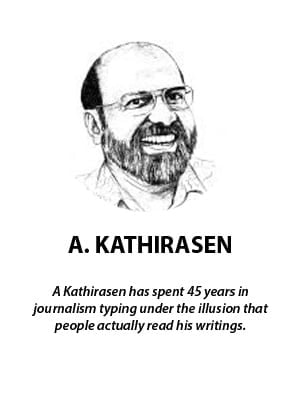
I did not expect 20,000 people to converge on the Parliament complex today (Feb 27) to answer electoral reform group Bersih’s call to protest slow reforms by the Anwar Ibrahim administration. I expected about 2,000.
But, as it turned out, only about 100 turned up.
Does this mean Bersih is no longer as powerful as it once was? Or is there some other reason for the low turnout?
The respected coalition of NGOs had in the past attracted thousands of people. For example, in 2011, about 50,000 answered Bersih’s call to demonstrate for electoral reforms.
In 2015 and 2016, it led protests to seek the removal of then prime minister Najib Razak after the 1MDB scandal broke. The momentum created led to the defeat of Najib’s Barisan Nasional coalition and the victory of the Pakatan Harapan coalition in the 2018 general election.
That is why I was surprised when only about 100 people marched in the Bersih rally to the Parliament complex to hand over a memorandum calling for reforms – including those promised in the election manifestos of Pakatan Harapan and Barisan Nasional — to be expedited.
Pasir Gudang MP Hassan Abdul Karim and Selayang MP William Leong, both from Anwar’s PKR, received the memorandum. Other MPs who also accepted the memorandum were Sungai Petani MP Taufiq Johari, Muar MP Syed Saddiq Abdul Rahman, Pasir Mas MP Ahmad Fadhli Shaari and Ledang MP Syed Ibrahim Syed Noh, according to reports.
Dressed largely in black and yellow shirts, as had been suggested by Bersih, the demonstrators carried placards with words such as “100 per cent reformasi” (I00% reforms) and “Malu apa Madani” (What’s there to be ashamed of, Madani?), a play on the slogan previously used by Najib’s supporters, Malu apa bossku? (What’s there to be ashamed of, my boss?).
Bersih chairman Faisal Abdul Aziz said after the rally that it was only the first step in efforts to get the government to implement reforms.
FMT quoted him as saying: “This is Bersih’s first step to remind the Madani government, and the MPs who campaigned with the (Pakatan Harapan) manifesto, to reform the nation. We urge the government to provide a timeline and roadmap for the implementation of the reforms for the benefit of the people.
“We also want the government to stop the practice of granting a discharge not amounting to acquittal to any politician being prosecuted for corruption and misuse of funds,” he said.
The protest march went without a hitch. About 300 policemen were present but they did not interfere.
So, why was the number so small this time?
Bersih deputy chairman Wong Yan Ke was quoted in one report as saying that the low turnout had been expected as the march was held on a weekday, and also that it was only intended to be a small rally.
He said the march was held on a Tuesday (Feb 27) to coincide with the year’s first parliamentary meeting, which was opened by the new Yang di-Pertuan Agong Sultan Ibrahim.
So it seems Bersih did not push hard for a large crowd.
Certainly, the short notice given before the protest was held – it was announced on Feb 24 – is one reason for the low turnout. There was not much time for people to make arrangements, including applying for leave or coming from far away.
Another possible reason could be the warning by Kuala Lumpur police chief Allaudeen Abdul Majid on Feb 25 to the public not to participate in the rally or face “stern action”.
Allaudeen said no notice had been filed to inform the authorities about the demonstration, as per the Peaceful Assembly Act (PAA). Bersih submitted the notice a day before the protest.
Under the PAA, organisers of protests must give a five-day notice to the police or face a fine of up to RM10,000.
Sure enough, Dang Wangi police chief Noor Dellhan Yahaya said after the rally that the organisers would be summoned to give their statements for failing to provide at least five days’ notice to the authorities.
But neither Bersih nor its supporters are known to be afraid of being summoned by police. That is why I am surprised by the small turnout.
In the past, opposition parties backed Bersih, and their leaders and members would join the street protests. This time, however, the opposition did not. This would have contributed to the low turnout, I’m sure.
Isn’t the opposition – which includes Bersatu, PAS and Gerakan – interested in the reforms that had been promised but not fulfilled?
It’s interesting that one of the reforms promised is the enactment of a parliamentary act to provide for equitable constituency development funds for all parliamentarians, something that the opposition has been demanding.
So why did it not participate in large numbers?
Isn’t it interested in reforms such as the enactment of a political financing act, limiting the tenure of the prime minister to two terms, separating the powers of the public prosecutor and the attorney-general, ensuring transparency and parliamentary oversight in the appointment of key public officers, which are among the reforms Berish wants implemented?
Or is it that the opposition does not want to work with Bersih?
It is also possible that the low turnout was because people are just fed up with it all and have given up on politicians and their promises.
Perhaps times are so bad that they want to spend their valuable time and energy trying to earn money to sustain themselves and their families rather than take to the streets to convince thick-skinned politicians to keep their promises. - FMT
The views expressed are those of the writer and do not necessarily reflect those of MMKtT.
No comments:
Post a Comment
Note: Only a member of this blog may post a comment.